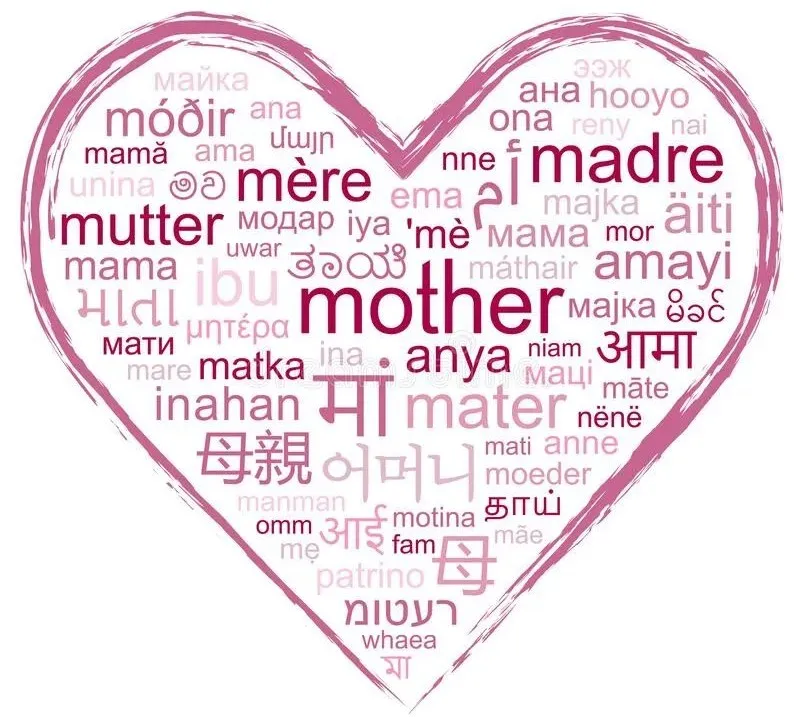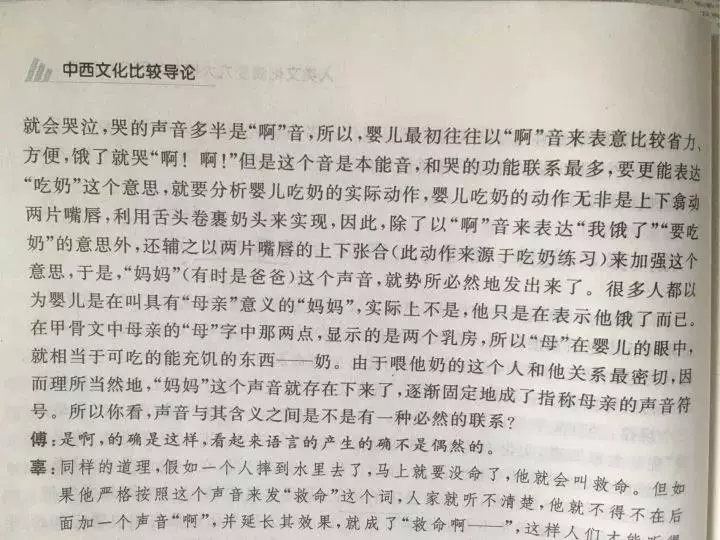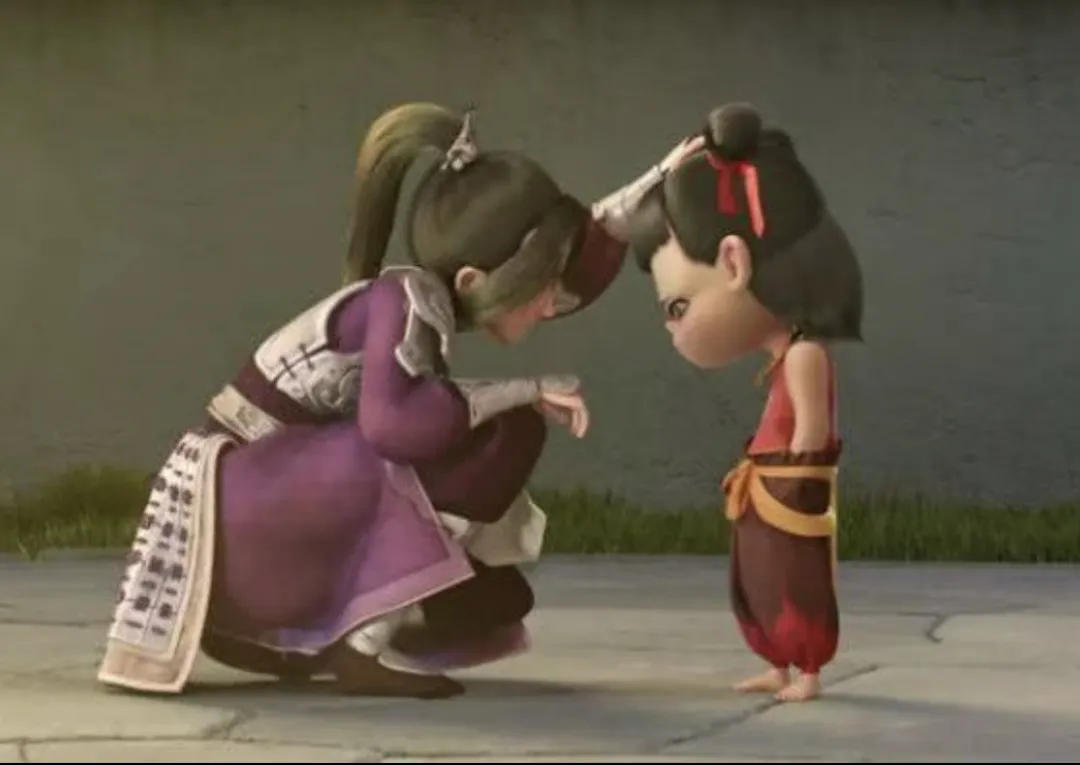全世界使用人数超5000万的语言就有73种。但有一个词,使几乎全人类的语言产生了奇妙的重合,那就是"ma"——我们用来呼唤这个世界上与我们最亲密的人。
In a world with over 73 languages, one word transcends linguistic boundaries with striking similarity: "ma" — the sound humans use to address their mother, the person most intimately connected to their own existence.

妈妈
英语:mother, mom, mummy;
德语:die Mutter, Mutti;
法语:mère, maman;
希腊语:μητέρα(罗马字mitera),μαμ;
俄语:ма́ть(matvi);
爱沙尼亚语:ema;
保加利亚语:мамо;
泰语:แม่;
韩语:어머니(o mo ni)
为什么全世界的妈妈发音里都有"ma"呢?
北京大学外国语学院世界文学研究所教授辜正坤老师在《中西文化比较导论》中提到,m这个音很可能是婴儿索要奶水的声音,引申为妈妈。
Professor Gu Zhengkun of Peking University notes that the "m" sound likely originates from a baby's instinctual demand for milk, evolving into a term for the nurturing figure.

辜正坤《中西文化比较导论》图源:语言服务
从生物学的角度,地球上所有的哺乳动物都有一种最核心的共有情感——母婴联结(mother-infant bond),几乎所有的哺乳动物的母亲都是以哺乳来建立她和孩子间最本质的情感。
From a biological perspective, all mammals on Earth share a most fundamental emotional experience—the mother-infant bond. Nearly all mammalian mothers establish this primal emotional connection with their offspring through lactation.
英语中哺乳动物的单词也正是"mammal"与"mama"同源于拉丁文"mamma"。每个字的发音与其含义之间也必然伴随着千丝万缕的联系。
The English term "mammal" and the word "mama" both trace their etymological roots to the Latin "mamma" (breast/mother). The phonetic components of these terms and their meanings are inherently intertwined through intricate connections.
一些语言学的研究认为,"ma"这个词在全世界有这么高的相似度,很有可能是受到了人类古老的共同语言存留的影响。
Linguistic studies suggest that the striking cross-cultural similarity of the "ma" sound may stem from remnants of humanity's ancient proto-language, preserved through millennia of evolutionary and cultural transmission.
之所以世界上基本所有的语言中“妈妈”发音都为"ma",还有一个根本原因,那就是:人的本能。
The fundamental reason why the word for "mother" is universally pronounced as "ma" across nearly all human languages lies in human instinct.
当婴儿两只眼睛的视线逐渐形成了焦点能看清东西,并且视线的接触范围也开始逐渐扩大时,就开始了对环境的认识的过程。
在婴儿的小小世界里,妈妈的含义还不是真正意义上的妈妈,而只是乳汁和温暖的象征。
As infants develop visual focus and their field of vision gradually expands, they begin to cognitively map their environment. In an infant's nascent worldview, the concept of "mother" represents not the conceptual mother but rather a symbol of nourishment and warmth.
为什么婴儿会发出"ma"音呢?
Why do infants instinctively produce the "ma" sound?
这是因为婴儿出生时发声器官尚未发育,他们开口啼哭,会发自然长音"a"。当他们吸吮母乳时由于口腔封闭,气流经由鼻腔冲出,便发出了"m"音。
Infants, equipped with undeveloped vocal organs, naturally produce the simplest sounds, such as the nasal consonant "m", formed by closed lips during breastfeeding, and the vowel "a", a primal cry.

mama/papa是婴儿最早、最容易发出的语音。只需要把嘴巴张开、声带振动就可发出元音[a],而双唇辅音[m][p][b]发音时无须舌头的参与,是婴儿最早学会的辅音。
The syllables "mama/papa" constitute infants' earliest and most effortless vocalizations. Babies can produce the vowel [a] by simply opening their mouth with vocal cord vibration, while the bilabial consonants [m], [p], and [b] require no tongue articulation, making them the first consonants infants master.
所以当他们想吃奶的时候,就会主动想发"m"的声音,因为吃不到就会哭,自然发出"a"的音,连着一块就变成了"ma"。
When seeking milk, infants instinctively attempt the [m] sound (associated with suckling motions). The subsequent crying naturally produces the [a] sound when unsatisfied, which combine to form "ma" through this primal behavioral sequence.
每次婴儿发出"ma"的声音,母亲的养育反应:喂养、抱着与安抚,都会强化这个词的意思。
Each time a child utters "ma", a mother's nurturing reaction — feeding, holding, soothing — reinforces the word’s meaning.
祝妈妈们节日快乐!今天是母亲节,你想对妈妈说什么呢?
Happy Mothers’ Day to all moms! Today, as we celebrate this special occasion, what words of love and gratitude would you share with your mother?
文章来源:中国日报双语新闻
(本网站只做公益分享,如有侵权,请联系删除。)